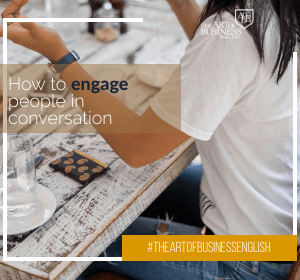About How to Engage People in Conversation
Do you feel shy when you have to socialise in English? Are you missing out on networking and relationship building opportunities?
If you want to feel more confident when socialising in English then this course is perfect for you. We reveal some little secrets that will help you to feel more comfortable engaging people in conversation.
After taking this course you will have practical vocabulary, expressions and techniques to “break the ice”, open up a conversation, keep a conversation going. Furthermore, you will learn pronunciation and intonation skills to make you sound more confident. Learn how to react to different types of news.
This short course is packed with actionable information that you can start to use tomorrow.
Click here to purchase the course.
Welcome to the "How to engage people in conversation in English" online course. Watch the video above to learn what we will be covering on the course.
Premium fast track course Open vs. Closed Questions
In lesson one we analyse the difference between open and closed question types and how they have a big role to play in socialising.
In lesson two, we cover the importance of the Present Perfect tense in social settings. Learners look at how we can use it to form open ended questions that can easily generate discussion.
In lesson three, we look at what are commonly referred to as WH questions. These are the who, what, when and hows. Understanding how to form these questions is essential for good conversation skills.
In lesson four, we look at the secrets behind tag questions and how they can help make it easy for people to answer and respond to you in social situations. If you don't know what tag questions are or how to use them then this lesson will reveal it all.
Premium fast track course How to open a conversation
In lesson five, we look at the language and expressions necessary for starting a conversation. From breaking the ice, to get the other person involved.
In lesson six, we go deep into more practical communication skills and focus on how being a good listener is the key to great communication. This high level training not only teachers you the language you need, but also shows you the soft skills you will need to maintain a conversation.
In lesson seven we take a look at the linguistic, intonation and body language skills required to show interest in what someone tells you. Here we cover adjacency, and a wide range of expressions.
In lesson eight we show you the linguistic skills required to help you make the correct response to both positive and negative news. Native people expect to hear certain expressions when sharing news and making an incorrect statement can cause some discomfort or embarrassment.
In lesson nine we look at the best way to bring a conversation to a close. We show you the techniques that will help you do this confidently and without making the other person feel uncomfortable.
About the Teacher
Andrew is the CEO and founder of the Art of Business English. Besides teaching and coaching native Spanish speakers in Business English, he is also passionate about mountain biking, sailing and healthy living. When He is not working, Andrew loves to spend time with his family and friends.

 How to engage people in conversation
How to engage people in conversation